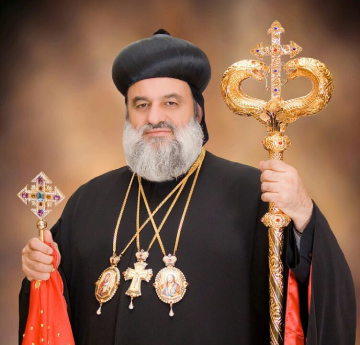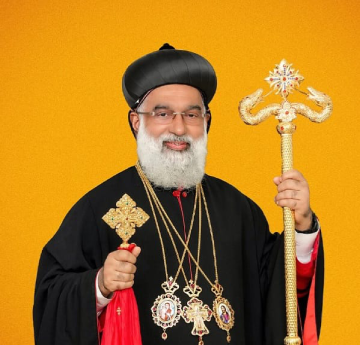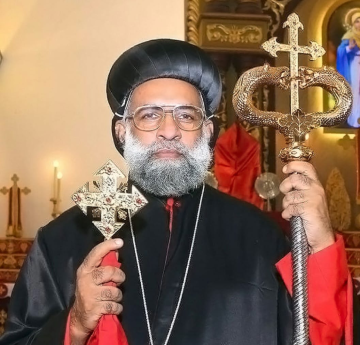
Moran Mor Ignatius Aphrem II – 123rd successor of St.Peter
PATRIARCH OF ANTIOCH AND ALL THE EAST
Supreme Head of the Universal Syriac Orthodox Church

Aboon Mor Basalious Joseph
Catholicose of Malankara




The St. Mary's Jacobite Syrian Orthodox Church on the Gold Coast is affiliated with the Malankara Jacobite Church in India, which is governed by the Holy Apostolic See of Antioch and all the East, with His Holines Moran Mor Ignatius Aphrem-II as supreme head and His Beatitude Catholicos Baselios Thomas-I as spiritual head in India.
Our Congregation was founded in December 2017 by immigrant families and individuals of Syrian Christian followers from Kerala, India, under the guidance and leadership of His Eminence Mor Milithios Yuhanon Metropolitan, Syrian Orthodox Archbishop in Australia, to worship Lord Jesus Christ in the Syrian orthodox traditional faith and pass it on to the next generation.
On December 2nd, 2017, Rev. Fr. Thomas Puthiyamadathil led the inaugural Holy Qurbana at studio village community center, Oxenford . During the early days, he provided us with spiritual support and leadership, allowing our church to grow as a spiritually devout society with a firm faith in the Lord Jesus Christ. Consequently, Rev. Fr. Robin Daniel, Mulanjanamattathil, has served our congregation over the years. Following then, our parish has grown significantly from a handful of people to contemporary families with strong faith and spirituality, thanks to God's mercy and the prayers of our patron saint, St. Mary. We are now spiritually connected, and our vicar, Rev Fr. Geevarghese Kuzhiyelil (Jigi Achan), leads and guides us.
Our church runs services every 2nd and 4th week of Sundays. Evening prayer begins at 03:00pm, Holy Qurbana at 03:30pm followed by Sunday school. Our liturgy is conducted mainly in Malayalam and includes Syriac and English.
The Jacobite Syrian Orthodox Church stands as a vibrant testament to the enduring legacy of Christianity in the East. As an integral part of the Syriac Orthodox Church of Antioch and All the East, it traces its roots back to the very beginnings of the Christian faith, with a rich history intertwined with the apostolic mission of St. Thomas the Apostle.
Tradition holds that St. Thomas himself brought Christianity to India in 52 AD, establishing communities and ordaining clergy. This early foundation laid the groundwork for the flourishing of the Syrian Orthodox Church in India.
The Church recognizes the primacy of the Patriarch of Antioch, presently His Holiness Moran Mor Ignatius Aphrem II, whose lineage extends back to St. Peter the Apostle who established the See of Antioch around 37 AD. This connection underscores the Church’s deep roots in the early Christian Church and its commitment in apostolic succession.
The Church believes in the Holy Trinity, which means that God is One in Essence but exists in three Hypostases: the Father, the Son, and the Holy Spirit. The Jacobite Syrian Orthodox Church adheres to Miaphysite Christology, which emphasizes the unity of the divine and human natures in the person of Lord Jesus Christ. This theological stance aligns it with the Oriental Orthodox communion.
The church uses the Peshitta, a Syriac translation of the Bible, and its Malayalam translation, Vishudhagrandham. The primary liturgical service is the Holy Qurbono, celebrated using Liturgy of St. James and others. The liturgy is rich in symbolism and emphasises the mystical union of the believer with Lord Jesus Christ. The service includes readings from the Bible, prayers, and hymns, many of which are preserved in the Beth Gazo, a collection of Syriac melodies.
The church recognizes seven sacraments: Baptism, Chrismation (Confirmation), Eucharist, Confession, Matrimony, Holy Orders, and Anointing of the Sick.
Daily prayers are an essential part of the church’s spiritual life, with specific prayers designated for different hours of the day, known as the Shehimo.
The church upholds the teachings of the first three Ecumenical Councils; Nicaea (325 AD), Constantinople (381 AD), and Ephesus (431 AD) The Jacobite Syrian Orthodox Church sees itself as part of the One, Holy, Catholic, and Apostolic Church. It emphasizes the importance of maintaining the apostolic succession and the teachings handed down from the early church fathers.